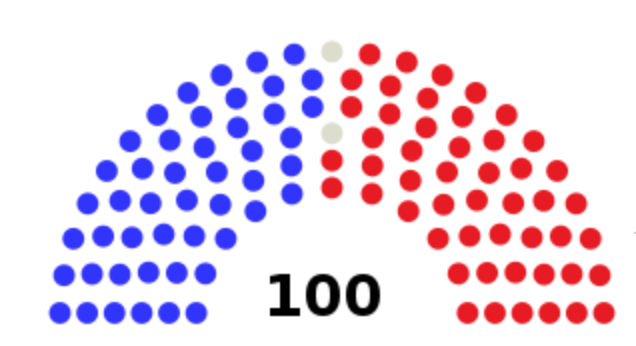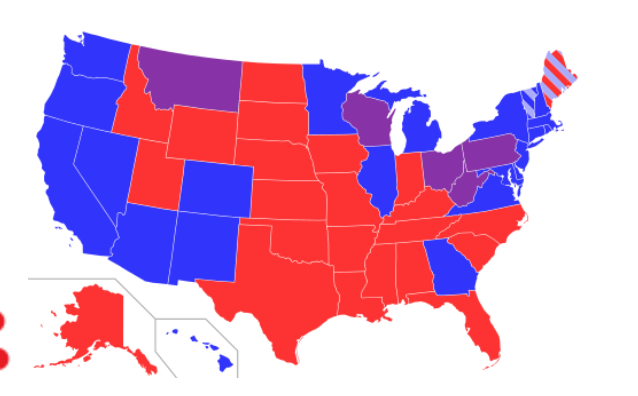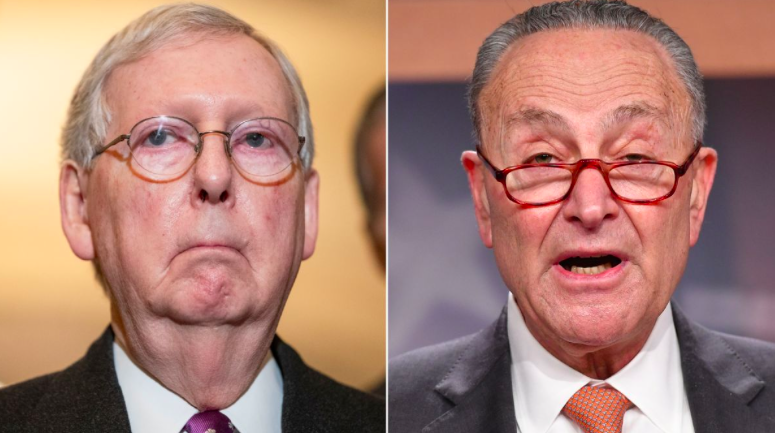UNITED STATES SENATE: Power-Sharing Agreement
March 2, 2021

117th Congress – Senate Seating
Majority: (from January 20, 2021)
48 Democrats
*2 Independents caucus with Democrats*
Minority: (from January 20, 2021)
50 Republicans

Current Senate composition by state and party
Blue – 2 Democrats
Blue-Light Blue Strips – 1 Democrats and 1 Ind.
Purple – 1 Democrat and 1 Republican
Red-Light Blue Strips – 1 Republican and I Ind.
Red – 2 Republicans
On February 3, 2021, a Power-Sharing Agreement was validated in the United States Senate among both the political parties. This permits the Democrats to take control and chair the committees after winning the majority in the respective chamber by flipping it from GOP control. Initially, Senator Chuck Schumer (D-NY) became the Senate Majority Leader on January 20, 2021 when the new Senators-Elect Jon Ossoff (D-GA), Raphael Warnock (D-GA), and Alex Padilla (D-CA) were sworn in by Vice President Kamala Harris. This technically gives the Democrats the majority; the Senate is equally divided. Notably, Vice President Harris casts a tie-breaking vote (occurrence of unanimous Republican opposition or 50 nays) in key legislation, resolution, judgement, confirmation of Cabinet and Federal Judicial nominees.
However, a standoff has halted the party from taking control of the key committees since the chamber intervened under the rules of the 116th Congress when Republicans had the majority. In order to determine how power would be divided, a power-sharing agreement between Senate Majority Leader Chuck Schumer and Senate Minority Leader Mitch McConnell was needed as the Senate has an even partisan split of 50-50 with Vice President Harris capable of breaking ties. Numerous Democrats expressed support in eliminating the Legislative Filibuster that gives the right to the Minority party to block legislation through the 60-vote rule. Democrats wanted to pass President Biden’s Agenda through a simple majority vote and avoid any partisan gridlock that can potentially come from Republicans. Senate Minority Leader Mitch McConnell (R-KY), released his demand for an iron-clad in-writing guarantee that Democrats will not end the filibuster. Moreover, two Democrats indicated that they will NOT vote to repeal the Filibuster are Senator Joe Manchin (D-WV) and Senator Kyrsten Sinema (D-AZ). The lack of an agreement had caused Democrats complications and delayed consideration of the Cabinet of President Joe Biden’s Cabinet nominees, presumably including Attorney General nominee, Merrick Garland, who is anticipated to receive Bipartisan support and not to face any significant opposition. In contrast, despite his Supreme Court confirmation was blocked by the Senate Republican Majority back in 2016 during the 114th Congress under Then-President Obama, who nominated him to fill the vacancy created by the passing of the Late Justice Scalia.
McConnell said in a statement after the agreement was approved, “This power-sharing agreement is almost identical to the 2001 agreement and will allow the Senate to be fairly run as an evenly-split body.” He later announced committee assignments for the 117th Congress, with Senate Republicans still retaining crucial committee seats who objected to the results of the Electoral College on January 6, giving them a strong and prominent platform in the new Congress.
On February 3, 2021, Schumer announced that an agreement on power-sharing had been reached in principle and that it would be approved by the Senate later in the day. Schumer gave a statement, “I am happy to report this morning that the leadership of both parties have finalized the organizing resolution for the Senate,” Schumer said on the Senate floor. “We will pass the resolution through the Senate today, which means that committees can promptly set up and get to work with Democrats holding the gavels.” Schumer said that with a power sharing agreement in place that will give Democrats committee gavels, they “are ready to hit the ground running on the most important issues that face our country” and “are not going to waste any time.” It was unclear what had been holding up the deal as of Feb 3 morning. Before finalizing the power-sharing agreement that will formally allow Democrats to take their chairmanship, party leaders had negotiated over a final few points, including how to arrange committee budgets.
The pause was already having an impact on nominees from Biden’s Cabinet going through the Senate confirmation process. On February 1, 2021, Sen. Lindsey Graham (R-SC), the chairman of the Senate Judiciary Committee, refused a Democratic proposal to schedule Garland’s February 8 confirmation hearing, stating that the Senate wants to concentrate on former President Donald Trump’s second impeachment trial, which is expected to begin the following day. With the Power-Sharing Agreement, Democrats can now move more rapidly on confirming the new Cabinet and the legislative filibuster is still maintained as a 3/5 of the Senate (60 votes required) for key legislation and resolution.
